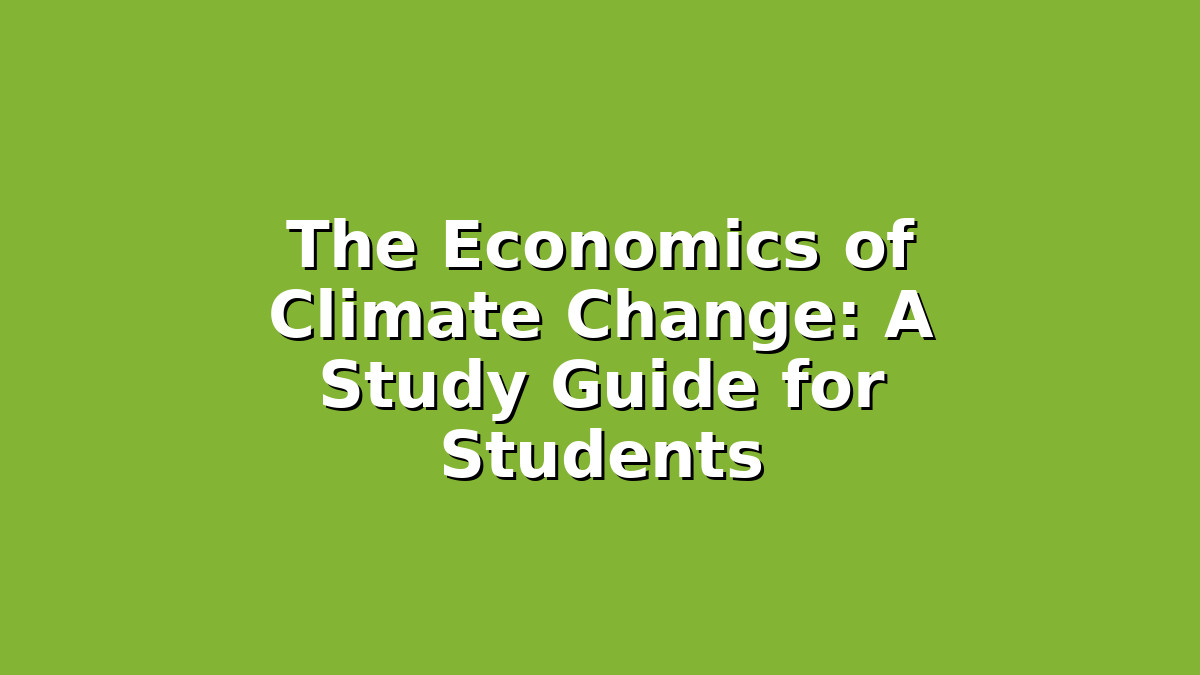Climate change is one of the most pressing issues facing our planet today. Understanding its economic impact is crucial not only for grasping the challenges ahead but also for preparing for exams in economics, environmental science, or related subjects. If you’re a student aiming to excel, this article will break down the economics of climate change and provide study tips to help you master this complex topic effectively.
Introduction
Climate change refers to long-term changes in temperature and weather patterns, primarily caused by human activities like burning fossil fuels. The economics of climate change examines how these environmental changes affect economies worldwide and the cost-benefit analyses of policies designed to mitigate or adapt to these effects. For students, understanding this intersection between environmental science and economics is vital because it sheds light on global policy debates, sustainability efforts, and the future of economic growth.
This article will guide you through three essential areas: the economic impacts of climate change, market failures and policy responses, and cost-benefit analysis in climate economics. Alongside, you’ll find practical study advice tailored to help you understand and retain this information for exams.
—
1. Economic Impacts of Climate Change: What You Need to Know
The first step in studying the economics of climate change is grasping its direct and indirect effects on the economy. Climate change influences agriculture, health, infrastructure, and labor productivity, which in turn affect GDP and economic stability.
Key concepts to focus on:
– Damage to agriculture: Changes in rainfall patterns and extreme weather events can reduce crop yields, affecting food supply and prices.
– Health costs: Increased heatwaves and the spread of diseases such as malaria strain healthcare systems.
– Infrastructure damage: Floods, hurricanes, and wildfires damage roads, buildings, and utilities, leading to costly repairs.
– Labor productivity: Rising temperatures can reduce workers’ productivity, especially in outdoor industries.
Study Tip: Use real-world examples
Link theoretical concepts to current events or historical case studies. For example, study how Hurricane Katrina’s economic impact in 2005 affected the United States or how droughts in sub-Saharan Africa influence economic output. Using examples makes abstract ideas tangible and easier to recall during exams.
Study Tip: Create mind maps
Draw a mind map connecting climate change effects to different economic sectors. Visual organization helps you see the bigger picture and identify relationships between ideas, improving comprehension and memory retention.
—
2. Market Failures and Policy Responses: Understanding Why Governments Intervene
A critical concept in climate economics is the idea of market failure. Climate change is a prime example of a market failure because individual companies and consumers do not bear the full costs of their carbon emissions, leading to overproduction of greenhouse gases.
Key concepts to focus on:
– Externalities: These are costs or benefits that affect third parties. Carbon emissions are a negative externality because they harm the environment and society.
– Public goods and common resources: Clean air and climate stability are public goods, which are non-excludable and non-rivalrous, making them difficult to manage through markets alone.
– Government interventions: Policies such as carbon taxes, cap-and-trade systems, subsidies for renewable energy, and regulations aim to correct market failures.
Study Tip: Summarize policy tools in tables
Create a comparison table listing different policy instruments, their mechanisms, advantages, and disadvantages. This format is excellent for quick revision and helps you differentiate between approaches like carbon taxes versus cap-and-trade.
Study Tip: Practice explaining concepts aloud
Try teaching these concepts to a peer or even to yourself. Verbalizing explanations reinforces understanding and highlights any gaps in your knowledge before the exam.
—
3. Cost-Benefit Analysis (CBA) in Climate Economics: Making Decisions Under Uncertainty
Cost-benefit analysis is a fundamental tool economists use to evaluate climate policies. It involves comparing the costs of taking action to reduce emissions against the benefits of avoided damages from climate change.
Key concepts to focus on:
– Discounting future benefits and costs: Since climate change impacts span decades, economists use discount rates to calculate the present value of future costs and benefits.
– Uncertainty and risk: Predicting climate change impacts involves uncertainty, which complicates decision-making.
– Adaptation vs. mitigation: Adaptation involves adjusting to climate effects, while mitigation focuses on reducing emissions. CBA helps determine where to allocate resources.
Study Tip: Work through practice problems
Look for practice questions involving discount rates or cost-benefit calculations. Applying formulas and working through numerical examples solidifies your grasp on an otherwise abstract topic.
Study Tip: Use diagrams to illustrate concepts
Graphs showing marginal costs and benefits or the social cost of carbon can visually clarify complicated ideas. Drawing and labeling these diagrams can help you remember them when writing essays or answering exam questions.
—
Conclusion
The economics of climate change is a multifaceted subject that combines environmental science with economic theory and policy. As a student, breaking down this complex topic into manageable sections—economic impacts, market failures and policy responses, and cost-benefit analysis—can make your study sessions more effective and less overwhelming.
Remember to use real-world examples, visualize concepts with mind maps and diagrams, and actively engage with the material by teaching it aloud or doing practice problems. These strategies not only prepare you well for exams but also deepen your understanding of how economics plays a crucial role in addressing one of the world’s biggest challenges.
Stay curious, keep practicing, and don’t hesitate to reach out to teachers or peers if you need clarification. Your efforts in mastering the economics of climate change will not only help you succeed academically but also empower you to contribute thoughtfully to future conversations about sustainability and economic policy.
Good luck with your studies!

Responses